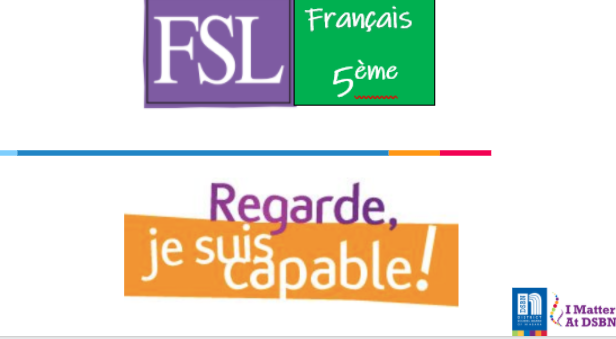Letter Regarding Virtual Core French
Dear Parents/Guardians of Virtual School Students,
Greetings from our Virtual School administrative team and DSBN’s curriculum department! The purpose of this letter is to update you on the virtual Core French program (Grades 4-8).
Thank you for your patience as we’ve worked through the process of setting up Core French instruction. As you know, there is a provincial shortage of qualified French teachers and staffing our Core French programs (both face-to-face and virtual) is a challenge. We are continually working on solutions to this challenge and feel optimistic that our virtual students will eventually benefit from both asynchronous and synchronous French instruction. For more detailed information on our virtual Core French program, see below.
Since we are in the early days of our asynchronous lessons, students will have an “N/A” in French on this year’s Progress Reports (November), but will have grades reported for French on the Term 1 Report Card (February).
If you have any questions about the virtual Core French program, please reach out to your Virtual School’s administrator.
Yours in education,
Jennifer McDowell (Principal, Virtual School 1)
Shelley Fehrman (Principal, Virtual School 2)
Kara Veld (Vice-principal, Virtual Schools)
Jayann Young (Vice-principal, Virtual Schools)
Melanie Sendzik (Principal, FSL Curriculum)
Virtual Core French Program – Term 1
To begin, we’ve started posting French learning tasks in what was formerly the ‘Period 6’ widget so that students can re-engage with the French language. The title page on the weekly slideshows looks like this:

These early activities are a form of review since many students have not used the French language for more than half a year. For now, the learning tasks are focused on the Listening, Speaking, and Reading strands. Writing activities will be layered in as students gain (regain) their skills in the other strands.
A significant part of our Language instruction (whether it’s in English or French) is about metacognition (the ability to think about one’s thinking). This skill includes being able to identify strengths in learning (e.g I’m really good at Listening in French because…) as well as next steps for learning (e.g. I need to work on Writing in French. I’m going to practice by….). Our first assessment tasks for all Core French students will address their metacognition and ability to set goals for learning. These tasks will be shared via a hyperlink to a Google Form. Students should keep their eyes out for hyperlinks and their due dates (embedded in the slideshows). As we progress through the content, Google Form assessments will be collected for Listening and Reading activities while Writing tasks will be completed in Google docs and submitted via Google Classroom (we will create tutorials so families are familiar with this process). Students will continue to practice speaking following prompts in the videos and by recording sound files and submitting them to Google Classroom (upper grades). Once we are able to offer synchronous sessions (scheduled with each class to supplement the daily lessons), further development of speaking skills will take place.
As we move towards Term 1 report cards, virtual Core French students will be working on the following units:
Grade 4 – Mon robot respectueux
Grades 5 & 6 – La belle province
Grade 7 & 8 – On est en forme
These high-quality units have been prepared by our own DSBN staff and are based on each grade’s curriculum expectations.

